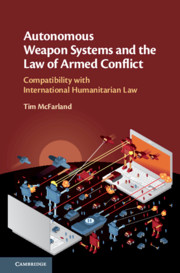 Autonomous Weapon Systems and the Law of Armed Conflict
Autonomous Weapon Systems and the Law of Armed Conflict Published online by Cambridge University Press: 17 June 2020
This first, introductory chapter explains that the purpose of the book is to detail how international humanitarian law addresses development of autonomous weapon systems. IHL seeks to maintain a balance between competing concerns: primarily, the necessity for States to protect their national interests through military means when peace fails and their obligation to serve broader humanitarian goals by limiting the harm inflicted on those involved in armed conflict. Accordingly, the law must be revised and updated as the technology of war changes. The book discusses the ways in which law must respond to use of autonomous weapon systems in order to maintain the balance. The remainder of the chapter sets the scope of the discussion: the book does not advocate for or against autonomous weapons, only assesses their compatibility with existing IHL; it does not focus on any specific weapon system, but on autonomy as a capability; and the legal frame of reference is the First Additional Protocol to the 1949 Geneva Conventions.
To save this book to your Kindle, first ensure [email protected] is added to your Approved Personal Document E-mail List under your Personal Document Settings on the Manage Your Content and Devices page of your Amazon account. Then enter the ‘name’ part of your Kindle email address below. Find out more about saving to your Kindle.
Note you can select to save to either the @free.kindle.com or @kindle.com variations. ‘@free.kindle.com’ emails are free but can only be saved to your device when it is connected to wi-fi. ‘@kindle.com’ emails can be delivered even when you are not connected to wi-fi, but note that service fees apply.
Find out more about the Kindle Personal Document Service.
To save content items to your account, please confirm that you agree to abide by our usage policies. If this is the first time you use this feature, you will be asked to authorise Cambridge Core to connect with your account. Find out more about saving content to Dropbox.
To save content items to your account, please confirm that you agree to abide by our usage policies. If this is the first time you use this feature, you will be asked to authorise Cambridge Core to connect with your account. Find out more about saving content to Google Drive.